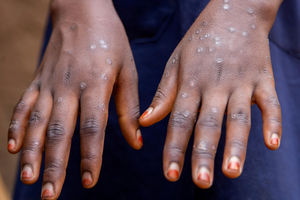State in Sh6.7bn plan to combat Mpox

Kenya has confirmed five cases one each in Taita Taveta, Busia, Nairobi, Mombasa and Nakuru.
What you need to know:
- Estimated budget for local containment of the outbreak, according to the plan is allocated Sh1.7 billion.
- Kenya has confirmed five cases one each in Taita Taveta, Busia, Nairobi, Mombasa and Nakuru.
The Ministry of Health has allocated over Sh6.7billion towards the management of Mpox in Kenya, according to the country’s preparedness and response plan.
The plan, signed by Public Health and Professional Standards Principal Secretary Mary Muthoni and acting deputy director general of Health, Dr Sultani Matendechero, outlines a comprehensive strategy for addressing the disease.
The budget is divided into three key areas: local allocation for containment of the outbreak, regional control of the disease and the national control of the outbreak.
These measures aim to equip the country with the necessary resources to effectively manage and contain Mpox outbreaks.
Estimated budget for local containment of the outbreak, according to the plan is allocated Sh1.7 billion.
The budget for controlling regional spread in less than five counties will cost over Sh2.3 billion with the national control of the outbreak spread of the outbreak costing over Sh2.6 billion.
Kenya has confirmed five cases one each in Taita Taveta, Busia, Nairobi, Mombasa and Nakuru.
The National Public Health and Laboratory has received and sampled 149 cases with six others awaiting laboratory confirmation.
Overall, 9,917 travelers have been screened in the last 24 hours with a cumulative 799, 663 travelers screened at 26 ports of entry across the country.
On the local containment budget, temporary isolation spaces (repurposed containers in 14 high risk counties) will consume the huge junk of the money at Sh800 million followed by procure treatment commodities and establishing and equipping Mpox training units which will cost Sh230million.
Referral of cases and contact tracing of active cases will cost tax payers Sh195million with training and sensitizing community health workers on Mpox allocated Sh92million.
Sensitizing school community on Mpox has been allocated Sh120million, procurement of personal protective equipment and hand sanitisers to enhance protection of community health promoters while conducting community surveillance and health promotion activities has been allocated Sh50million.
Procurement of thermoguns and servicing of existing thermoscanners has been allocated Sh10million.
Subcommittee meetings and stakeholders mapping meetings allocated Sh2.7 million though not indicated that the money will carter for.
“Based on the unfolding scenarios, foresight is needed to prepare for diverse outcomes, allowing for the adaptation of strategies to mitigate risks, optimize resource allocation, and safeguard public health, the economy, and national stability,” the document states.
Even though there are other activities repeated, building health workers’ capacity to detect, diagnose, and manage Mpox (Training Budget) will cost Sh941 million on estimated budget for controlling the regional spread of Mpox cases in less than five counties.
Procurement of 40 reverse osmosis water treatment equipment Sh240million with risk communication and community engagement costing Sh200million.
Procurement of infection prevention and control logistics for school community will cost Sh100 million while printing, disseminating, and distributing guidelines has been set at Sh2.5million.
From the plan, on the regional spread category, the country will focus sustaining active case search, contact listing and tracing and case management.
At the national budget where more than five counties are involved, risk communication and community engagement interventions has been allocated over Sh1 billion with Sh500million for infection prevention and control interventions.
Referral of cases at the stage has been allocated Sh10million while building health workers’ capacity to detect, diagnose, and manage the outbreak has been given an additional Sh100million.
Providing technical support and oversight to the county trainer of trainees will cost Sh20million.
“The country shall activate surge capacity and ramp up response activities. Risk communication and community engagement shall play a key role through the active engagement of the community. Information is provided on key drivers of the outbreak, negative behaviours that promote transmission via human-to-human, and regular monitoring of the outcome/impact of the key messages being passed to the community members,” it states.





